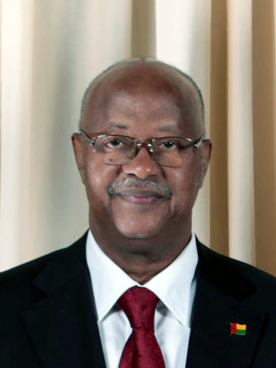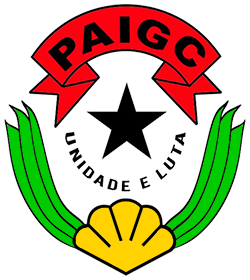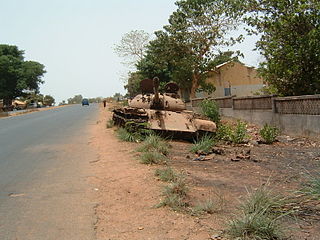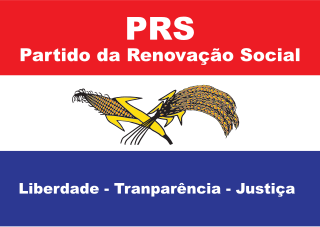| |||||
| Decades: | |||||
|---|---|---|---|---|---|
| See also: | |||||
The following lists events that happened during 2012 in Guinea-Bissau .
| |||||
| Decades: | |||||
|---|---|---|---|---|---|
| See also: | |||||
The following lists events that happened during 2012 in Guinea-Bissau .

The politics of Guinea-Bissau take place in a framework of a semi-presidential representative democratic republic, with a multi-party system, wherein the President is head of state and the Prime Minister is head of government. Executive power is exercised by the government. Legislative power is vested in both the government and the National People's Assembly.

Kumba Ialá Embaló, also spelled Yalá, was a Bissau-Guinean politician who was president from 17 February 2000 until he was deposed in a bloodless military coup on 14 September 2003. He belonged to the Balanta ethnic group and was President of the Social Renewal Party (PRS). In 2008 he converted to Islam and took the name Mohamed Ialá Embaló. He was the founder of the Party for Social Renewal. In 2014, Ialá died from a cardiopulmonary arrest.

Carlos Domingos Gomes Júnior is a Bissau-Guinean politician who was Prime Minister of Guinea-Bissau from 10 May 2004 to 2 November 2005, and again from 25 December 2008 to 10 February 2012. He has been the President of the African Party for the Independence of Guinea and Cape Verde (PAIGC) since 2002 and is widely known as "Cadogo". He resigned as prime minister on 10 February 2012 to run in the presidential election triggered by President Malam Bacai Sanhá's death on 9 January.

The African Party for the Independence of Guinea and Cape Verde is a political party in Guinea-Bissau. Originally formed to peacefully campaign for independence from Portugal, the party turned to armed conflict in the 1960s and was one of the belligerents in the Guinea-Bissau War of Independence. Towards the end of the war, the party established a socialist one-party state, which remained intact until multi-party democracy was introduced in the early 1990s. Although the party won the first multi-party elections in 1994, it was removed from power in the 1999–2000 elections. However, it returned to office after winning parliamentary elections in 2004 and presidential elections in 2005, since which it has remained the largest party in the National People's Assembly.

João Bernardo "Nino" Vieira was a Bissau-Guinean politician who served as President of Guinea-Bissau from 1980 to 1999, except for a three-day period in May 1984, and from 2005 until his assassination in 2009.

The Guinea-Bissau Civil War was fought from 7 June 1998 to 10 May 1999 and was triggered by an attempted coup d'état against the government of President João Bernardo Vieira led by Brigadier-General Ansumane Mané. Government forces, backed by neighbouring states, clashed with the coup leaders who had quickly gained almost total control over the country's armed forces.

Elections in Guinea-Bissau take place within the framework of a multi-party democracy and a semi-presidential system. Both the President and the National People's Assembly are directly elected by voters.

Presidential elections were held in Guinea-Bissau on 19 June 2005, with a second round runoff on 24 July. The elections marked the end of a transition to democratic rule after the previously elected government was overthrown in a September 2003 military coup led by General Veríssimo Correia Seabra. The result was a victory for former president and independent candidate João Bernardo Vieira.

Malam Bacai Sanhá was a Guinea-Bissau politician who was President of Guinea-Bissau from 8 September 2009 until his death on 9 January 2012. A member of the African Party for the Independence of Guinea and Cape Verde (PAIGC), Sanhá was President of the National People's Assembly from 1994 to 1999 and then served as acting President of Guinea-Bissau from 14 May 1999, to 17 February 2000, following the ouster of President João Bernardo Vieira. Standing as the PAIGC candidate, he placed second in the 1999–2000 presidential election as well as the 2005 presidential election before winning the June–July 2009 presidential election.

The Party for Social Renewal is a political party in Guinea-Bissau. It is one of the country's leading parties and is currently the main opposition party.
Ansumane Mané was a Bissau-Guinean soldier who led a 1998 uprising against the government of President João Bernardo Vieira, which caused a brief but bloody civil war.
Manuel Saturnino da Costa was a Bissau-Guinean politician who served as Prime Minister of Guinea-Bissau from 26 October 1994 to 6 June 1997.

Raimundo Rodrigues Pereira is a Bissau-Guinean lawyer and politician who was interim President of Guinea-Bissau from 3 March 2009 to 8 September 2009 and again in 2012, following the departure of President Malam Bacai Sanhá for medical treatment abroad; he continued in that capacity after Sanha's death. Pereira was elected as President of the National People's Assembly on 22 December 2008. Pereira is a member of the African Party for the Independence of Guinea and Cape Verde (PAIGC). He was ousted in a coup on 12 April 2012 and succeeded by Mamadu Ture Kuruma.

Presidential elections were held in Guinea-Bissau on 28 June 2009 following the assassination of President João Bernardo Vieira on 2 March 2009. As no candidate won a majority in the first round, a second round was held on 26 July 2009 between the two leading candidates, Malam Bacai Sanhá of the governing African Party for the Independence of Guinea and Cape Verde (PAIGC) and opposition leader Kumba Ialá. Sanhá won with a substantial majority in the second round, according to official results.
Military unrest occurred in Guinea-Bissau on 1 April 2010. Prime Minister Carlos Gomes Junior was placed under house arrest by soldiers, who also detained Army Chief of Staff Zamora Induta. Supporters of Gomes and his party, PAIGC, reacted to the move of the military by demonstrating in the capital, Bissau; Antonio Indjai, the Deputy Chief of Staff, then warned that he would have Gomes killed if the protests continued.

Presidential elections were held in Guinea-Bissau on 18 March 2012 following the death of President Malam Bacai Sanhá on 9 January. A run-off was set to be held on 29 April after being postponed by a week as announced by electoral commission chief Desejado Lima Dacosta. However, after a military coup, the leading candidates were arrested and the election was cancelled. The junta's spokesman then announced plans to hold an election in two years, despite condemnation. General elections were subsequently held in April 2014.
Adiato Djaló Nandigna is a Bissau-Guinean politician and a former acting Prime Minister of Guinea-Bissau. Her government was overthrown in the 2012 Guinea-Bissau coup d'état, and she was arrested by the security services in 2013. She later returned as the Minister of Defence in the 2015 cabinet of Prime Minister Carlos Correia.

On 12 April 2012, a coup d'état in Guinea-Bissau was staged by elements of the armed forces about two weeks before the second round of a presidential election between Carlos Gomes Júnior and Kumba Ialá. The coup started in the evening with military personnel and equipment making its way onto the streets, followed by the state-owned media being taken off-air.

José Mário Vaz is a Bissau-Guinean politician who served as president of Guinea-Bissau from 23 June 2014 to 27 February 2020.